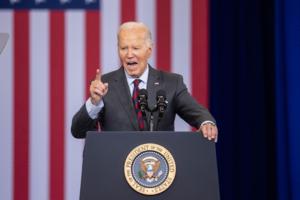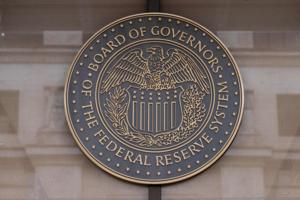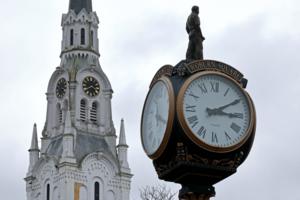Politics
/ArcaMax

LZ Granderson: A 'Trump economy' robs from the American people to enrich the elite
Believing Donald Trump will be better for the economy than Vice President Kamala Harris is like thinking you're a dinner guest when you're actually the main course.
There's a reason three billionaires — including Elon Musk — poured $220 million into Trump's reelection bid this summer, and it's not because they felt the pinch when the price ...Read more

Joe Battenfeld: Biden's 'lock him up' attack on Trump exposes desperate Dem agenda
In New Hampshire last week Joe Biden accidentally on purpose revealed what Donald Trump and his supporters have long claimed, that the Justice Department’s prosecution of Trump is purely political.
Whether it was a slip of the tongue or not, Biden articulated the Democrats’ real strategy to prevent the former Republican president from ...Read more

Nolan Finley: Money isn't talking in the presidential race
Money can sell a political message, but it can’t buy one.
Vice President Kamala Harris is proving no amount of cash can cover for a candidate who has nothing to say to voters.
The numbers are astounding. Harris raised $222 million in September, bringing her three-month total to $632 million. The monthly haul was more than three times the $67...Read more
Commentary: My grandfather's teacher, murdered for resisting Nazis, has lessons for Americans today
“They took Knut’s teacher, you know.”
It was something my late grandmother often said when, as a child, I asked about life in Norway during World War II. Sometimes she’d talk about sawdust-laden bread rations and sharp-dressed thugs out and about for the five years Nazi forces brought Norway’s democracy to heel, but she seemed ...Read more

Robin Abcarian: Poisoned, imprisoned and essentially killed by Putin, Alexei Navalny somehow never lost hope
If you've ever wondered what it's like to die by nerve agent — the kind of poison Russian President Vladimir Putin is known to use against his enemies — I highly recommend Alexei Navalny's posthumous memoir, "Patriot."
The story begins in the summer of 2020. Navalny, the charismatic Russian opposition leader and anti-corruption crusader, is...Read more

Editorial: Trump's threat to the Fed's independence is no joke
A second Donald Trump presidency poses grave dangers for the U.S. Weighed against the chances of exploding public debt, the collapse of global trade and the erosion of democratic norms, the risk that he’d attack the Federal Reserve’s independence might seem trifling. It isn’t.
An effective central bank is indispensable for economic ...Read more

Commentary: Why I as a teacher won't use artificial intelligence
A colleague said he called a meeting with his daughter’s Advanced Placement English teacher because the teacher responds to student writing using artificial intelligence. He has a problem with that.
AI, the AP teacher said, gives instant feedback. When my colleague told me where his daughter attends, a suburban school that beats our school ...Read more

Editorial: Lessons from East Palestine have yet to be made law. That must change
Despite the scale and complexity of last year's Norfolk Southern train derailment disaster in East Palestine, Ohio, there is bipartisan legislation in Congress that may actually codify some of the lessons learned from the tragedy — creating lasting changes and taking steps towards preventing future tragedies. However, since the Railway Safety ...Read more

Commentary: Time to terminate the torture of time changes
It happens twice a year. On the second Sunday in March, clocks are turned forward one hour, while on the first Sunday in November, they are turned back by the same amount. This “spring ahead, fall back” clock change ritual has been going on (and off) for well over one hundred years, and it is time to stop.
Several people have been ...Read more

Commentary: Christian nationalism's legacy of hate
For three years, from the ages of 13 to 15, I attended an evangelical Christian summer camp in Wears Valley, Tennessee. Billed as an adventure camp (it included activities such as archery and river tubing), this was the first place where I was exposed to an ideology that would later become known as “Trumpism.”
In this week-long camp, our ...Read more

Commentary: Could Dolly Parton help lead our nation to a 21st-century Great Awakening?
In the 18th and 19th centuries, two spiritual “great awakenings” shook up much of our young nation. Ministers stopped reading their sermons — and started preaching directly to the masses via what we now call revivals.
Princeton University historian Sean Wilentz notes that in the aftermath of our revolution, as few as 1 in 10 Americans ...Read more

Commentary: Felons are barred from many jobs; president should be one of them
What can a felon do? Become president of the United States.
What can’t a felon do? That’s quite the list.
Ever since Donald Trump was found guilty of falsifying business records back in May — something that hasn’t changed despite the fact he has managed to have his sentencing postponed until after the election — people have asked me,...Read more

Commentary: If you're rethinking going to college, think again
Social critics, editorial writers and authors are pleading these days for an end to America’s long emphasis on completing four years of college. They have a point. My father had nothing more than a two-year junior college degree when he turned writing skills learned in the Army into a middle-class life that included bachelor’s degrees for ...Read more

Commentary: Abortion, race and the fracturing of the anti-abortion movement
The Supreme Court’s Dobbs decision sent shockwaves through the very soul of America, shattering the fragile peace that once existed around the issue of abortion. But amid this upheaval, a quiet reckoning is taking place within the anti-abortion movement itself — a reckoning that lays bare the tangled threads of race, religion and power that ...Read more

Marc Champion: Israel's strike on Iran was smart. Now take the win
Israel has delivered a proportionate, justified and likely effective strike on Iran's missile and air-defense systems. This has forced a further dilemma onto Supreme Leader Ayatollah Ali Khamenei, as he tries to maintain deterrence without starting a wider regional war he can't afford, and whose consequences neither side would be able to predict...Read more

John M. Crisp: Is Donald Trump a threat to democracy?
Is Donald Trump a threat to democracy? It’s an interesting question that can be provocative and banal at the same time.
Liberals hear the provocative version. Despite our nation’s 248-year, more-or-less successful experience with democracy, liberals worry that our form of government is, historically, a rare and fragile thing. Many of them ...Read more

Doyle McManus: Listen to Trump's former aides: He'd be far more dangerous in a second term
Donald Trump's former White House chief of staff, retired Marine Gen. John F. Kelly, broke a long silence and denounced his former boss as a man who fits "the general definition of fascist."
The conservative, normally taciturn Kelly was moved to speak out after Trump condemned former House Speaker Nancy Pelosi, Rep. Adam B. Schiff and other ...Read more

Martin Schram: A Trump history lesson for young voters
With the presidential race virtually tied just a week before Election Day, perhaps the most astonishing poll numbers so far are the ones buried in the middle of the surveys that show how many young Black and Latino men think former President Donald Trump seems to be their kind of guy.
Among the most astonished should be Trump, himself. After ...Read more

Commentary: Here's why Chicago teachers are suing their own union
The Chicago Teachers Union, representing more than 25,000 educators, touts itself as “the most democratic institution devoted to this city’s schools.” But for more than four years, the CTU has failed to publish mandatory audited financial reports, an obligation intended to maintain transparency and trust between CTU leadership and its ...Read more

Commentary: Rainy day fund would help people who lose their jobs thanks to AI
Artificial intelligence will eliminate jobs.
Companies may not need as many workers as AI increases productivity. Others may simply be swapped out for automated systems. Call it what you want — displacement, replacement or elimination — but the outcome is the same: stagnant, struggling communities.
The open question is whether we will ...Read more


























































